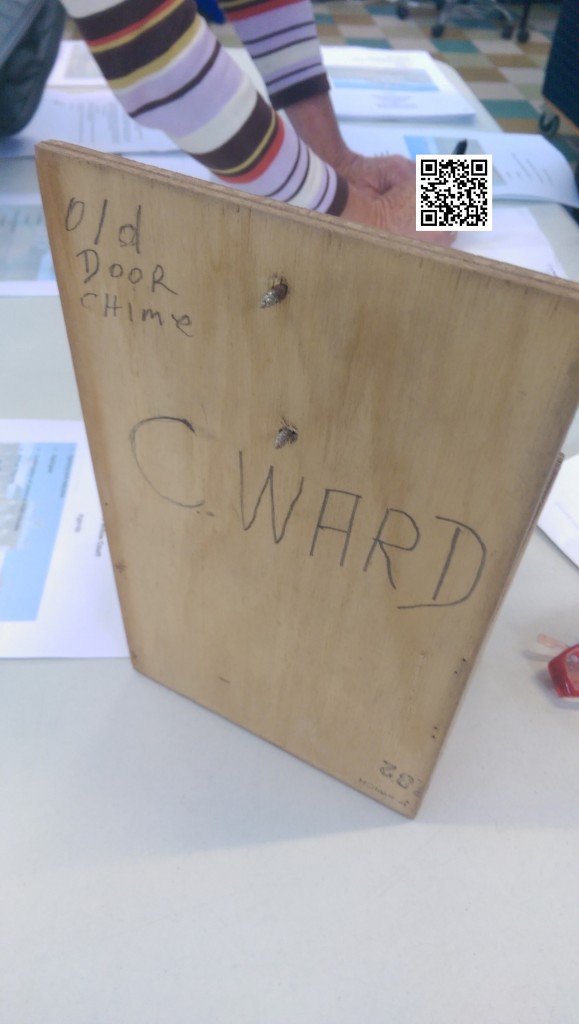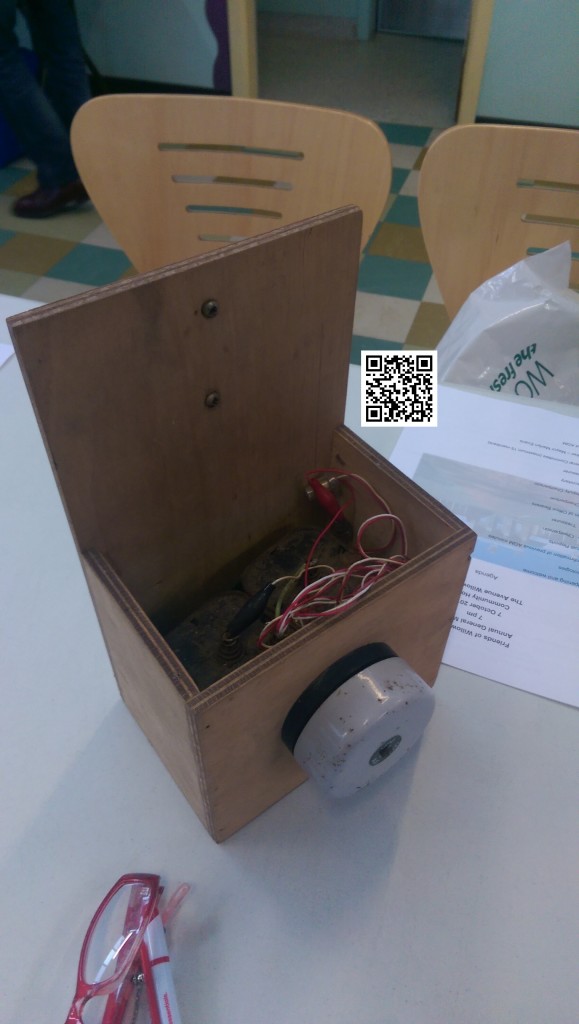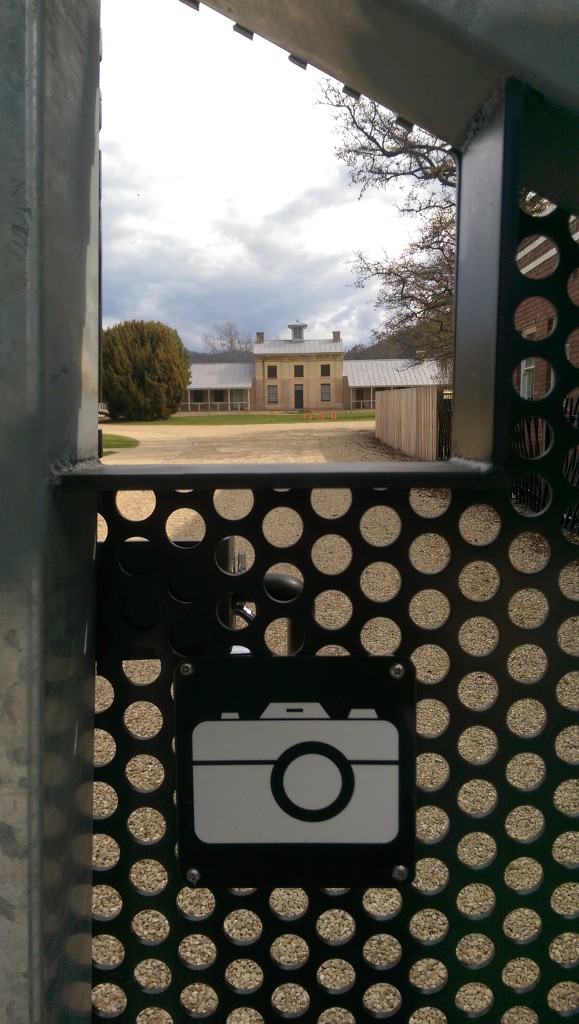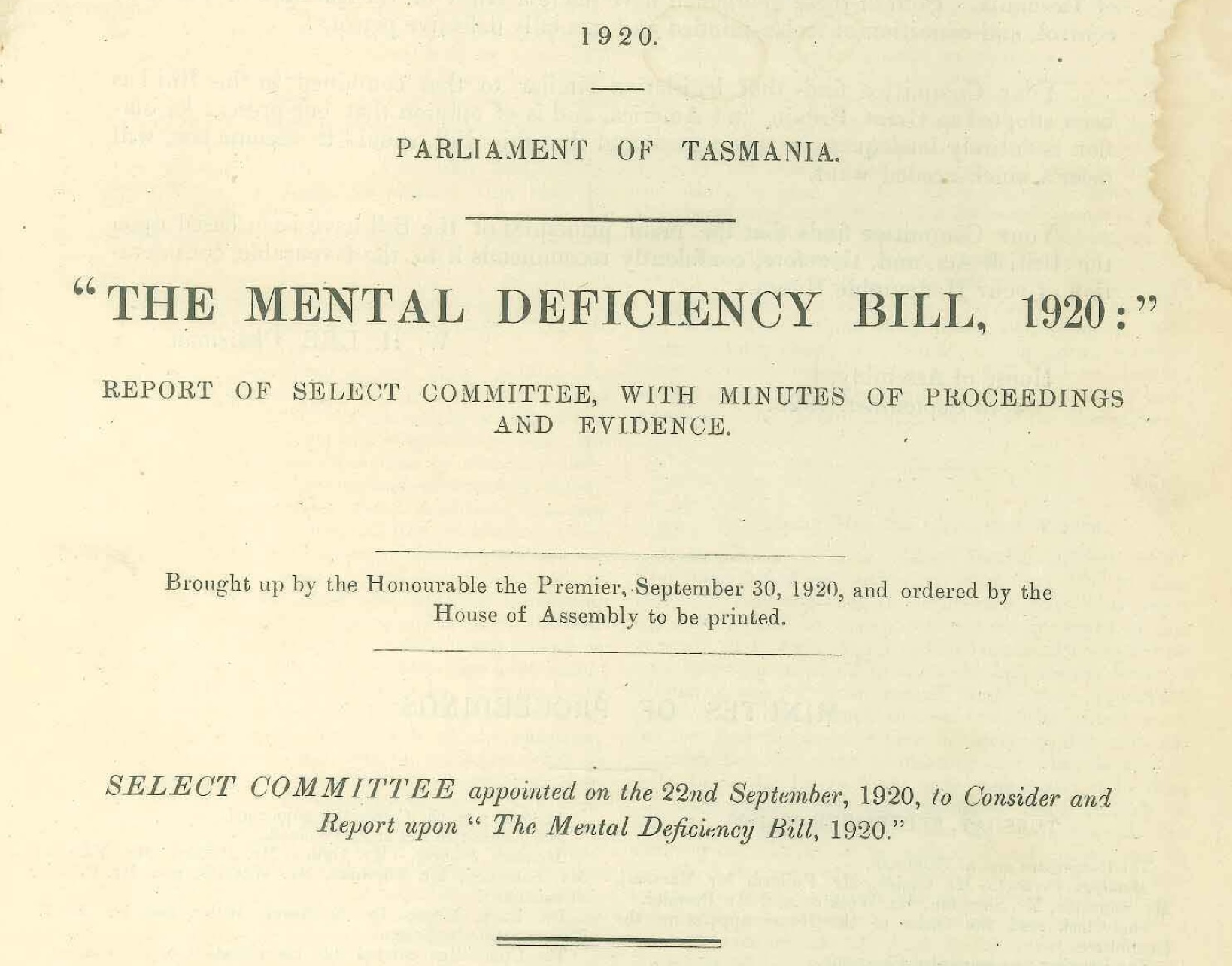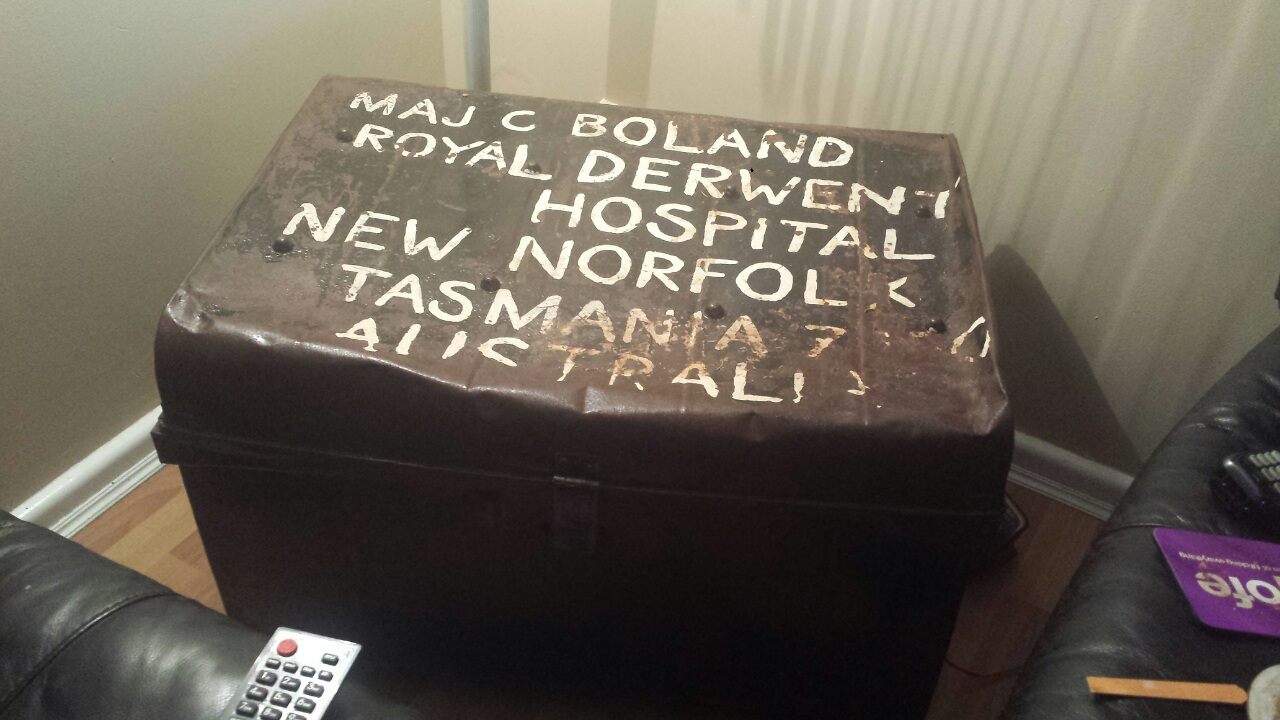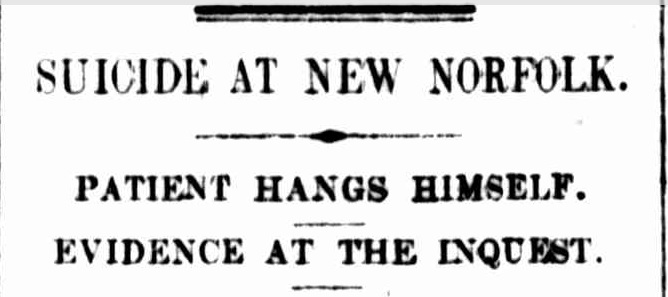Today I conducted a tour for a group of people through the Willow Court area. We started at the edge of the supermarket which once was the oval, the large supporting wall behind the building is still intact and stands to the memory of the one man (patient) who almost completed the wall himself. We went on and listen to Anne McKinstray’s audio tour of the oval wards G, E and D while looking at each of the remaining buildings. We then went past the different buildings along the Avenue and heard about one or two characters and some of their lives journey, working conditions and connections with wars and the community, this included Matron Morey and her story of the gold sovereign. Then over to Frascati House to hear how Dr Brothers wife worked to make camouflage nets for the second world war. We weren’t able to access the COMPLETED Barracks (stage one) area and felt disappointed not to be able to access this area and tell the wonderful stories that area had to say. Is that what you call a lost business and educational opportunity?
The bells are ringing
More and more articles, stories and artifacts are finding their way back to Willow Court. The most recent is this doorbell, which was located on Carlton House or C Ward. The person who supplied this prefered to stay anonymous, but stated that there was many of these and that each ward had one. As there were many trades people on site they were build at Willow Court. The wooden box contained batteries with the bell on the outside. Not much is known about these and we would be interested to know more and if there were any stories attached that would be good. I could just imagine the local kids ringing and running, or was that just me?
Anyone interested in donating items can contact members of the Friends of Willow Court. I will supply contact details via email. Dont forget that we are now in possession of two artifact lists, so will monitor the listing of all things donated or loaned and would have no issue with involving police should something go missing.
Please be aware that there are a number of people/groups out there seeking donations, some for themselves and others are holding items but have not forwarded those entrusted items to be recorded within the collection.
Announcement: Willow Court Restoration Complete (stage 1)
New Norfolk News has reported that Willow Court Historic Precinct (stage 1) conservation work has now been complete. It was believed that Reporter and Councilor Damian Bester attended the Lyons Community Breakfast and has reported the words of Eric Hutchinson MP Members for Lyons.
“Mr Hutchinson touched on the significance of hosting the event at Willow Court, where the $2 million first stage of a conservation and redevelopment project has just been completed”
Eric Hutchinson also went on to update the gathered crowd about the Heritage listing of Willow Court
“He said the site’s nomination for National Heritage List status had progressed to the full assessment stage.”
We are keen, now that this announcement has been made, to know what the Derwent Valley Council’s plans are for the site. In particular:
Tours,
Public Access,
Community House relocation,
Educational tours,
Events for,
Ex-employees, Residents/Advocates and families and the general public.
We are excited to hear this announcement through the New Norfolk News outlet and we are pleased that Eric Hutchinson has taken this site on with such enthusiasm. It is hoped that the Council will announce its plans soon and we also hope that they are as enthusiastic and big picture as their Federal Member of Parliament.
Tasmania’s Eugenics History.
The Mental Deficiency Bill 1920 is a report from the select committee which was appointed on the 22nd September 1920 to consider and report upon the Bill. This 8 double page document looks at Tasmania’s 1920 Bill and supplies evidence and minutes of their proceedings.
“The Select Committee appointed by your Honourable House to consider the Mental Deficiency Bill has now the honour to present its report.
Your Committee went into the principles and details of the Bill exhaustively and obtained the views of Dr E. S. Morris, Chief Health Officer of the State, and Dr. E. Morris Miller, M.A., Litt. D Lecturer on Psychology and Philosophy at the University of Tasmania. Both of these gentlemen have made a study of the question of the care, control, and education of feeble-minded and mentally defective persons.
Your Committee finds that legislation similar to that contained in this Bill has been adopted in Great Britain and America, and is of opinion that our present legislation is entirely adequate in this regard, and that this Bill, should it become law, will meet a much needed want.
Your Committee finds that the main principles of the Bill have been based upon the British Act, and, therefore, confidently recommends it to the favourable consideration of your Honourable House.
W. H. LEE, Chairman.
House of Assembly,
28th September, 1920.”
This rare and original document is available in full and free from our documents tab HERE or clicking on the image above. Keep in mind that when the article refers to the Mental Diseases Hospital at New Norfolk it is referring to what we commonly now know as Willow Court or Royal Derwent Hospital.
One of the points on page 3 is an interesting read, here the Chief Health Officer’s Views are expressed:
“I thought the time was ripe at which to start the ball rolling towards educating the public in regard to this most important question. I was struck almost from the outset with the fact that the average man in the street does not distinguish between what is insanity and what is mental deficiency. He lumps them under one head, or he does not understand where the distinction lies. It may be well if I briefly describe to you the distinction we are working on. Both mental deficients and insane may be described as people without money ; but in one case a man has had a banking account and has become bankrupt; that is the insane person. The other one has not had a banking account at all; that is the mental deficient.
He starts off in life absolutely handicapped from birth. Whatever the cause of his mental deficiency, the one fact remains that he will never be able to come up to the standard we consider essential in the ordinary civilised state of existence. If he is of the lowest grade (an idiot), he is a nuisance until he is put in the hospital at New Norfolk-which, by the way, is only touching the very lowest type.”
Dr E. S. Morris,
Chief Health Officer of the State
This documents clearly stated how this Bill was designed to exclude people with Mental Health and or People with disabilities from their community and family of origin. It also has a clear intent to join the eugenics movement,
“The result of that is the man in a great many cases becomes a vagrant, a careless member of society; and the woman, in many cases, becomes likewise a vagrant, but worst of all, many of them of the lower grade become prostitutes, and people of that sort and all of them tend to propagate their own species.”
“While Nature plays an important part in eliminating the defect yet we cannot eliminate the possibility of propagation in the insane, but we can get these at the stage of mental deficients. By stopping them at that stage you are going to save two generations work on the part of Nature.”
This is the language of the time and the thoughts of the time. The report clearly has an opinion of stopping people from propagating as undesirables who will create more undesirables. This was to be done by housing them at New Norfolk.
Willow Court Open?
This morning Willow Court had its first event in the old Bronte Ward called the “Lyons Community Breakfast. The site officially remains closed for conservation work. Tours, or any sort of access for the general public hasn’t been available. This morning special guest the Prime Minister, Mr Malcolm Turnbull MP and the Member for Lyons Eric Hutchinson MP had an early start at the oldest asylum in Australia. Minister responsible for the Environment and Heritage, Mr Greg Hunt is also in Tasmania at the moment and it is unclear if he will attend. We are not sure if the Prime Minister had a tour of the buildings that are currently going through the Heritage listing process or if there was an opening ceremony of the site.
Senate inquiry: Violence, abuse and neglect of people with a disability.
We have recently learnt that some people have made submissions to the Senate Inquiry while living at the former Lachlan Park Hospital and Royal Derwent Hospital. Further submissions from people with disability or mental health conditions are sought by 11 November 2015.
The Inquiry are looking at Violence, abuse and neglect against people with disability in institutional and residential settings, including the gender and age related dimensions, and the particular situation of Aboriginal and Torres Strait Islander people with disability, and culturally and linguistically diverse people with disability.
The terms of reference are:
the experiences of people directly or indirectly affected by violence, abuse and neglect perpetrated against people with disability in institutional and residential contexts;
the impact of violence, abuse and neglect on people with disability, their families, advocates, support persons, current and former staff and Australian society as a whole;
the incidence and prevalence of all forms of violence, abuse and neglect perpetrated against people with disability in institutional and residential settings;
the responses to violence, abuse and neglect against people with disability, as well as to whistleblowers, by every organisational level of institutions and residential settings, including governance, risk management and reporting practices;
the different legal, regulatory, policy, governance and data collection frameworks and practices across the Commonwealth, states and territories to address and prevent violence, abuse and neglect against people with disability;
Australia’s compliance with its international obligations as they apply to the rights of people with disability;
role and challenges of formal and informal disability advocacy in preventing and responding to violence, abuse and neglect against people with disability;
what should be done to eliminate barriers for responding to violence, abuse and neglect perpetrated against people with disability in institutional and residential settings, including addressing failures in, and barriers to, reporting, investigating and responding to allegations and incidents of violence and abuse;
what needs to be done to protect people with disability from violence, abuse and neglect in institutional and residential settings in the future, including best practice in regards to prevention, effective reporting and responses;
identifying the systemic workforce issues contributing to the violence, abuse and neglect of people with disability and how these can be addressed;
the role of the Commonwealth, states and territories in preventing violence and abuse against people with disability;
the challenges that arise from moving towards an individualised funding arrangement, like the National Disability Insurance Scheme, including the capacity of service providers to identify, respond to and prevent instances of violence, abuse and neglect against people with disability; and
what elements are required in a national quality framework that can safeguard people with disability from violence, abuse and neglect in institutional and residential settings.
2. That for this inquiry:
‘institutional and residential settings’ is broadly defined to include the types of institutions that people with disability often experience, including, but not restricted to: residential institutions; boarding houses; group homes; workplaces; respite care services; day centres; recreation programs; mental health facilities; hostels; supported accommodation; prisons; schools; out-of-home care; special schools; boarding schools; school buses; hospitals; juvenile justice facilities; disability services; and aged care facilities; and
‘violence, abuse and neglect’ is broadly understood to include, but is not limited to: domestic, family and interpersonal violence; physical and sexual violence and abuse; psychological or emotional harm and abuse; constraints and restrictive practices; forced treatments and interventions; humiliation and harassment; financial abuse; violations of privacy; systemic abuse; physical and emotional neglect; passive neglect; and wilful deprivation.
People looking to understand what is required can find “easy read english” versions through the link below.
Help can be found at Advocacy Services:
Speakout
Advocacy Tasmania
Senate inquiry Violence, abuse and neglect of people with a disability.
Lectures for Attendants and Nurses, 1921 book
Picture of the front cover. Click picture to open the book.
This book is now scanned and available for you to read. This extremely rare publication contains the information for staff at the Mental Diseases Hospital, New Norfolk to carry out their work role.
Subjects include:
Anatomy and Physiology
Contagions and infectious diseases
Ethics of nursing
Nursing of Mental Diseases
The publication was printed in Tasmania for the Hospital and contain language, theories and practices of the time and should be read in this context
“Idiots and Imbeciles. They should be sent to special hospital, where they may, as far as possible, be educated or specially nursed and cared for.”
Click lectures for nurses and attendants 1921 full to read the full book in a separate tab. (this will take sometime to download, due to the size of the file)
Mystery Solved
Our facebook community are so good. On the weekend I was contacted and sent a picture of a old metal chest with the name MAJ C Boland Royal Derwent Hospital, New Norfolk, Tasmania, Australia painted clearly on the top. The person who posted me the picture was after the provenance for herself and the owner. So the mystery started. I posted the picture in our Facebook Group, our Facebook Page and another local New Norfolk Facebook Group and asked for help. I had a couple of hints at whom people thought it maybe and at one stage we thought it might have belonged to a previous patient at the Hospital. As is our policy with respecting patient\resident privacy, I almost chose to stop the hunt there.
I went back to the picture and after one of the group members suggested there was a Doctor with that name there in the 60’s I realised that the MAJ was the abbreviation for Major. With this new information and a possible military connection I investigated further and was able to find a connection to a Dr Boland in New South Wales in 2003 and also with the The Royal Australian and New Zealand College of Psychiatrists in 2008 after his death. With more information I was able to find Dr Boland’s eulogy, which had been thoughtfully written by his daughter.
Click to read DAD’S EULOGY which included Dr Boland’s family history at New Norfolk, Sandy Bay and finally Sydney. The owner of the case is planning to print out the eulogy and keep it with the old trunk. Mystery solved!
Suicide at New Norfolk, Patient hangs himself. 1916, inquest hears evidence.
Australian Research Council Linkage Projects Funding Proposal – Willow Court
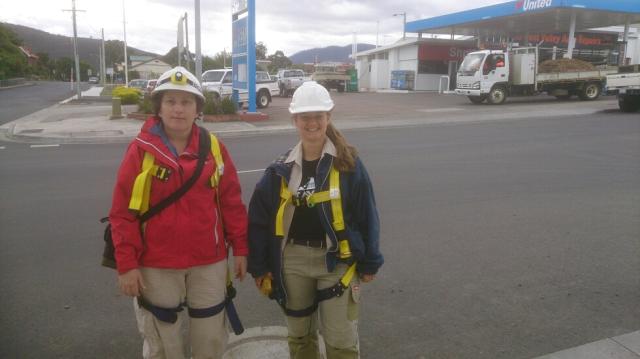 “The project proposed by Ms Burke will investigate the archaeology of Willow Court, using material research, historical research and looking at the sociological perspective of the site . There will be a public archaeology program that will use the material evidence to explore the community’s relationship with the site. This project (proposal attached for Councillors information) will provide valuable archaeological and social historical information on Willow Court, including interpretive and educational information. It is anticipated that the project, which runs over 3 years, will look at the staff/patient experience within Willow Court over 170 years, charting the shifts in treatment and understanding of mental illness. It will also provide valuable information on the archaeology of the site, much of which is unknown. There has been a great deal of focus on the heritage architecture of the site, however relatively little is known about its archaeology. It is anticipated that this study will provide a new perspective on life in Willow Court/ Royal Derwent for both patients and staff.”
“The project proposed by Ms Burke will investigate the archaeology of Willow Court, using material research, historical research and looking at the sociological perspective of the site . There will be a public archaeology program that will use the material evidence to explore the community’s relationship with the site. This project (proposal attached for Councillors information) will provide valuable archaeological and social historical information on Willow Court, including interpretive and educational information. It is anticipated that the project, which runs over 3 years, will look at the staff/patient experience within Willow Court over 170 years, charting the shifts in treatment and understanding of mental illness. It will also provide valuable information on the archaeology of the site, much of which is unknown. There has been a great deal of focus on the heritage architecture of the site, however relatively little is known about its archaeology. It is anticipated that this study will provide a new perspective on life in Willow Court/ Royal Derwent for both patients and staff.”
Read the full proposed agenda item to go before the Derwent Valley Council this month HERE
Left: Associate Professor Heather Burke and Associate exploring Burnett Street entry to tunnel.

